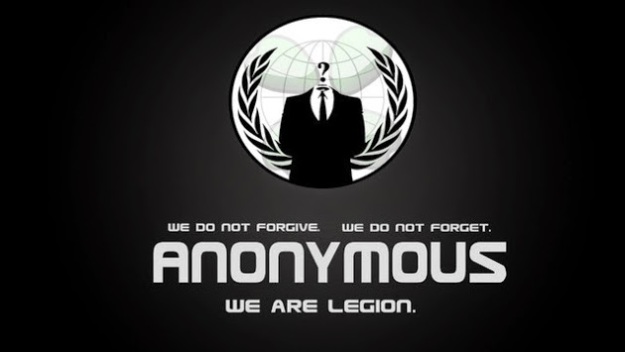 Summary: Our defense experts obsess over obsolete weapons while non-state groups perfect 4GW and cyberwar, one reason their forecasts for our wars are so often wrong. Unlike supercarriers and stealth fighters, these new forces will shape the 21st century. This post by cybersecurity expert Emilio Iasiello looks at Anonymous, a growing cyber-power.
Summary: Our defense experts obsess over obsolete weapons while non-state groups perfect 4GW and cyberwar, one reason their forecasts for our wars are so often wrong. Unlike supercarriers and stealth fighters, these new forces will shape the 21st century. This post by cybersecurity expert Emilio Iasiello looks at Anonymous, a growing cyber-power.
By Emilio Iasiello
Posted at Dead Drop (of the LookingGlass Cyber Threat Intelligence Group)
28 January 2015. Posted with his gracious permission.
The decentralized hacking enclave “Anonymous” is known for undertaking numerous campaigns that target perceived injustice, as well as cause general digital civil disobedience. Regardless, the group’s extensive membership is varied and widespread, gaining global attention for its various activities. The diversity of their campaigns adds to their mystique and further complicates public perception of their motives.
While Anonymous has received significant press from its recent efforts against the Islamic State of Iraq and Syria (ISIS) via the now-splintered offshoot the Ghost Security Group, there are several other campaigns that have slipped under the media’s radar. A recent article has surfaced highlighting some of these efforts that span across a variety of social issues. While some of their activities are not looked favorably upon by some, the enigmatic group’s recent engagements potentially demonstrate a maturing evolution into an issues-orientated movement that both thinks and acts globally.
The attention garnered by Anonymous has been important in drawing attention to those issues that may escape the public spotlight. Some of these include but are not limited to…
Operation Refugee Outreach: Billed as more of a social media campaign than a hacking effort, this operation focuses on the needs of refugees the group calls some of the most vulnerable people in society. On the group’s main website, it provides a list of materials and charitable organizations that people can contribute to in order to better serve those in need.
Operation Death Eaters: Partially prompted by the cover-up of the 1980s Westminster ring, this campaign is focused on exposing global pedophile networks. The group has called for an international effort to develop databases of all pedophile cases, cross-referencing connections across all aspects of society. According to one article on Operation Death Eaters, the group maintains that it wants to completely eliminate the child pornography industry by “dismantling the power structure which held it there and educating to create a cultural change.”
Operation Beast: This campaign focuses on targeting websites that promote and share bestiality content. The group has successfully hacked, defaced, and deleted several websites hosting this type of material. These activities serve to impact these purveyors of animal abuse as well as raise awareness about animal cruelty. In April 2015, Anonymous successfully defaced seven and removing six animal porn websites.
Operation Safe Winter: First initiated in 2014, the intent of this campaign is to bring attention to the challenges and difficulties of people living on the street have during the wintertime. It is hoped that in addition garnering attention for the cause, that it with other Anonymous groups as well as charitable individuals/organizations to participate in the distribution of services, donations, etc.
Anonymous evolves
While Anonymous may have started off as harassing pranksters, they have become increasingly more socially active as the group has evolved. And even though Anonymous has some less successful engagements (e.g., misidentifying the officer suspected in the Ferguson case), their desire to take up causes that support the oppressed such as striking against those governments conducting Internet censorship, and even protesting the rape of a high school girl by members of the football team, has put the collective in a more positive light.
Recent activity directed against ISIS is testament to the fact, garnering substantial media coverage for its ongoing efforts against the terrorist organization responsible for the Paris attacks. For many, these efforts represent the sentiments of those who cannot retaliate on their own. They are a collective that is at least doing something, if even in their own way, the majority of which is in a nondestructive, nonlethal manner.
Still, since anyone can proclaim himself or herself a member and declare an operation against a target, hacking activities against political figures or any entity that irks a member can become a viable target. This may be part of the reason why the group remains on the fringe, not quite modern day social justice Robin Hoods but not quite readily accepted by society for the totality of their sometimes altruistic activist convictions.
And this is where the group’s allure lies: the collective identity fostered by its members has a combination of both good and bad elements, depending on your own perception. In this regard, it is easy to recognize why certain events catalyze the group to action. Ultimately we may not condone the execution of some of their more brazen operations, but in those instances where moral convictions intersect, we can certainly understand the reasoning behind them.
————————————————–
About the Author
Emilio Iasiello has more than 12 years’ experience as a strategic cyber intelligence analyst, supporting US government civilian and military intelligence organizations, as well as a private sector companies. He has delivered cyber threat presentations to domestic and international audiences and has published extensively in peer-reviewed journals.
No comments:
Post a Comment